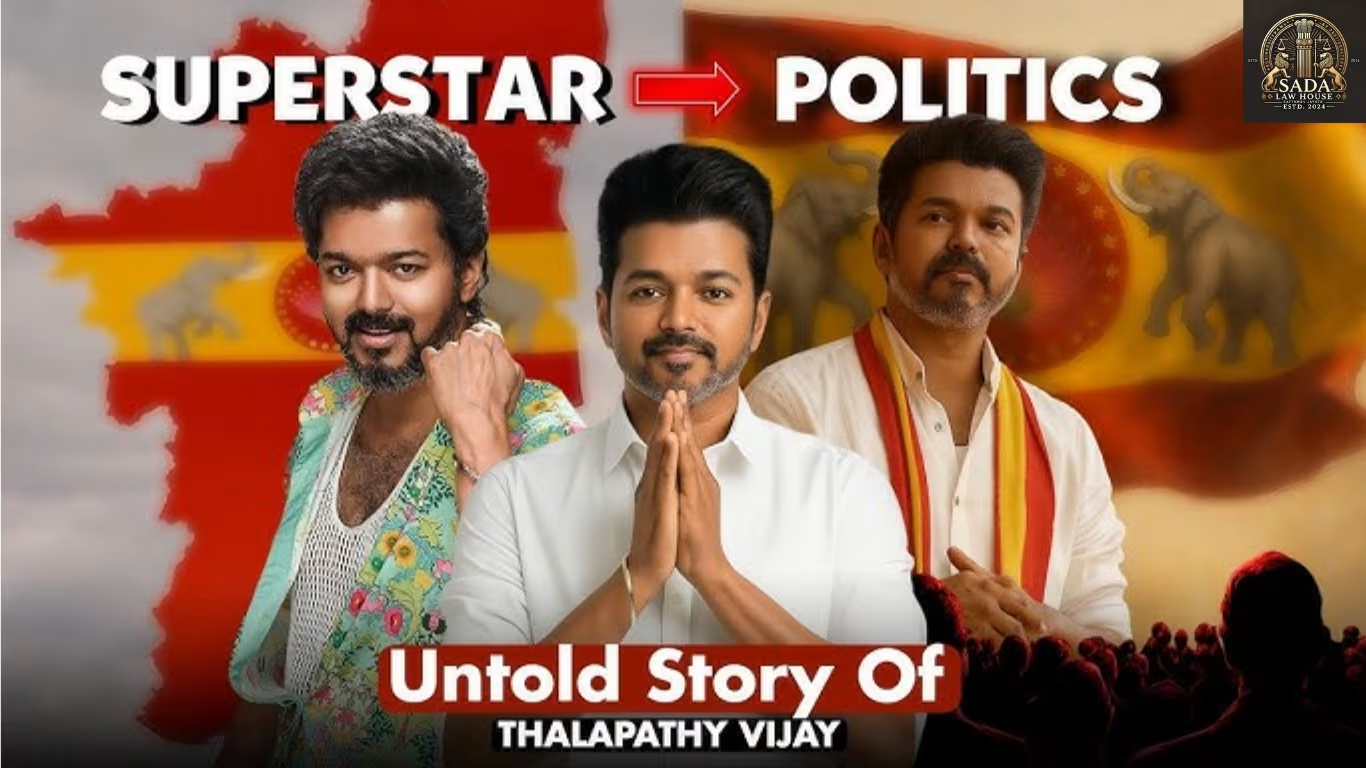From Screen Legend to People’s Leader: Vijay’s Realpolitik Journey
- Shivani Garg
- 15 September 2025

Introduction
From silver screen charisma to the uncertain but high-stakes world of politics, Joseph Vijay — popularly known as “Thalapathy” — is attempting one of Tamil Nadu’s most ambitious transitions. His popularity as a mass hero has long been evident, but the launch of his political party, Tamilaga Vettri Kazhagam (TVK), signals a calculated shift into the arena of realpolitik, where fanfare must translate into votes, structures, and governance.
Early Screen Rise & Mass Appeal
Vijay’s journey began under his father S. A. Chandrasekhar’s direction, with Naalaya Theerpu (1992) marking his debut as a lead actor. Through the 1990s and early 2000s, he worked with celebrated directors like Vikraman, Fazil, Vasanth, and S. J. Surya, gradually transitioning from a romantic hero to a mass-action figure. Blockbusters such as Thirumalai, Ghilli, and Pokkiri cemented his “mass hero” image. His guaranteed box-office pull, loyalty-driven fan base, and ability to deliver consistent returns made him one of Tamil cinema’s most bankable stars.
Transition into Political Visibility & Infrastructure
Even before announcing his political plunge, Vijay carefully built visibility beyond films. His fan clubs evolved into the Vijay Makkal Iyakkam (VMI), which began grassroots welfare activities — free meals, tuition programs, blood and eye donation camps — across Tamil Nadu. This organisation, structured with booth committees and constituency-level networks, resembled a political apparatus more than a casual fan association.
Vijay also shaped his image through speeches and appearances. By stressing secularism, social justice, anti-corruption, and student empowerment, he sought to bridge his cinematic persona as a saviour of the oppressed with a political identity rooted in inclusivity and reform.
Formal Political Entry & Realpolitik Strategy
The launch of TVK formalised Vijay’s ambitions, but it also exposed him to the hard realities of politics:
Timing: He steps in at a moment when Tamil Nadu politics faces a perceived leadership vacuum. While the DMK is entrenched, critics point to complacency; the AIADMK remains weakened and fragmented.
Positioning: Vijay avoids overt alliances, presenting himself as an independent force that can channel social justice values and cross-community support.
Messaging: His rhetoric emphasises secularism and caste-neutral politics while steering clear of overtly communal tones. However, his ideological specifics remain ambiguous.
Organisation: TVK is steadily building ground infrastructure — booth-level committees, IT wings for digital mobilisation, and cadre-based networks — to convert fan enthusiasm into votes.
Risks, Uncertainties & Potential Outcomes
Vijay’s entry is buoyed by charisma, financial resources, and immense popularity. Yet, challenges abound:
Credibility in governance: Critics question whether a film star, however beloved, can navigate administration, coalition politics, and policymaking.
Ideological clarity: Broad slogans like “social justice” and “anti-corruption” need policy depth to distinguish TVK from entrenched players.
Sustained momentum: Fandom can bring crowds, but electoral success requires organisational stamina, ground logistics, and resilience in controversies.
If Vijay succeeds, he could redefine Tamil Nadu politics in the tradition of cinema icons like MGR and Jayalalithaa. But failure to consolidate beyond fan bases risks reducing TVK to a fleeting experiment, absorbed into Tamil Nadu’s established political patterns.
Conclusion
Vijay’s journey from superstar to political leader is more than a personal gamble — it is a test of whether celebrity charisma, grassroots mobilisation, and carefully crafted messaging can disrupt Tamil Nadu’s Dravidian strongholds. His realpolitik journey has just begun, and its success depends not on the size of his fan base but on his ability to deliver clarity, competence, and credible change.






